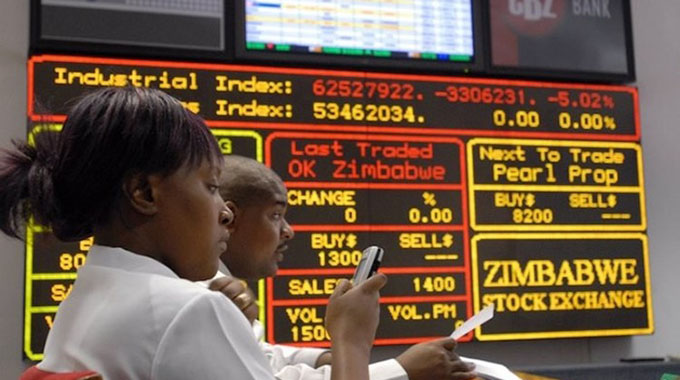SECZ speaks on state of capital markets
Business Reporter
The average participation by foreign investors on the country’s capital markets, the Zimbabwe Stock Exchange in particular, was generally depressed in 2018 and the first eight months of 2019, the Securities and Exchange Commission of Zimbabwe (SECZ) has said.
Foreign participation, which was only 34 percent of total activity in 2018 and improved to above 40 percent in 2019, was largely comprised of recycled funds according to SECZ chief executive officer Tafadzwa Chinamo.
While the 2019 figures “might seem as an improvement from 2018 figures, in real terms foreign participation has not really changed,” said Mr Chinamo responding to The Herald Finance and Business.
He said the exchange control directives issued this year on the repatriation of foreign proceeds and the 90-day vesting period on fungible shares have slowed down foreign participation in real terms.
“The Commission is in discussions with stakeholders to find ways of relaxing some of the measures to make them more attractive,” said Mr Chinamo.
As reported by our sister paper Business Weekly last week, foreign investors have been shunning the local market due to a myriad of challenges among them the inability to repatriate investments including earned dividends.
In addition, Zimbabwe’s prospects of an economic rebound remain under threat from a number of economic adversities both within and beyond borders, making investing in the country unattractive.
Mr Chinamo pointed out structural deficiencies and distortions in the economy as challenges that have resultantly curtailed market activity and subscription levels in most recapitalisation efforts.
The volatile exchange rate is one such challenge as investors cannot easily forecast future returns and risk exchange losses if currency instability continues for longer.
Since February, when the exchange rate was floated, it has moved from a rate of US$1: ZWL$2,5 to US$1: ZWL$15,25 as of yesterday.
These underlying challenges according to the SECZ boss will have a negative impact on new issuers on capital markets.
“Listing is generally a function of the underlying macroeconomic environment,” said Mr Chinamo.
During the period under review, there were three delistings, one new listing and a total of $22,5 million in capital raised on the market.
To turn around the situation, Mr Chinamo called for sustainable implementation of key structural economic reforms, saying this would be “critical in swaying investor perception and confidence towards broad-based economic growth and development”.
Currency reforms should be a clear focus area as investors across the world keep an eagle eye on movements.
Looking at the costs of participating on the local capital markets, Mr Chinamo said a reduction in trading costs would improve the competitiveness of the market within the region.
“The local market remains more expensive than its regional peers simply by comparing total trading costs,” said Mr Chinamo.
It costs 1,63 percent to buy shares and 2,443 percent to sale them. That’s 4,136 percent in total. In other words, investors can only start counting gains after price movements of more than 4,1 percent.
Turning to disclosure levels by issuers (listed companies), Mr Chinamo said the Commission is still battling limited information and weak corporate governance standards.
He said with globalisation, international capital tends to flow towards good governed investment destinations.
Adequate, equitable and timely disclosure of material information is critical for informed decision making, investor protection, market integrity and growth, he explained.
“Unsurprisingly SECZ had run-ins with some listed companies that had been at the centre of some public squabbles reported in media during the year.
“This, to some extent, is caused by shareholder apathy. It’s time investors get to know and understand their rights and responsibilities,” said Mr Chinamo.
“Investors have a right to adequate and timely provision of material information about companies they are invested in.”
He said investors, including the minority, have the right to question decisions by company management and bring them to task on issues that matter.
“Boards and shareholders need to be more intrusive and probe management on all major strategic decisions for openness and transparency.
“All too often the secrecy surrounding how companies are being run has resulted in shareholders only getting to know of their company problems at the point of liquidation,” said Mr Chinamo.










Comments